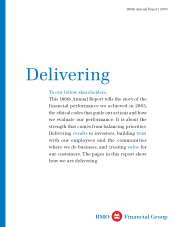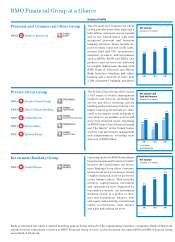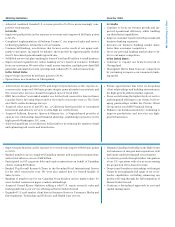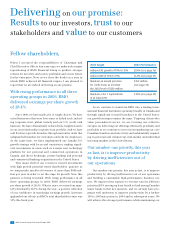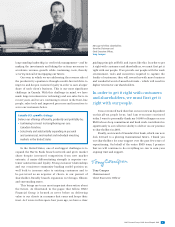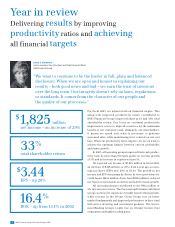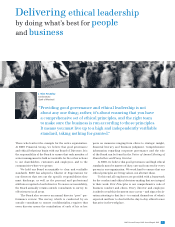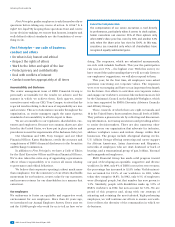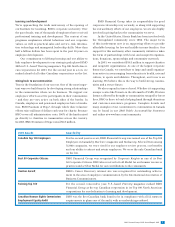Bank of Montreal 2003 Annual Report Download - page 10
Download and view the complete annual report
Please find page 10 of the 2003 Bank of Montreal annual report below. You can navigate through the pages in the report by either clicking on the pages listed below, or by using the keyword search tool below to find specific information within the annual report.
BMO Financial Group 186th Annual Report 20036
Delivering Ethical Leadership
First Principles guides employees to ask themselves three
questions before taking any course of action. Is it fair? Is it
right? Is it legal? By keeping these questions front and centre
in our decision-making, we ensure that honesty, integrity and
well-defined ethical standards are the foundation of every-
thing we do.
First Principles
–
our code of business
conduct and ethics
▪Do what is fair, honest and ethical
▪Respect the rights of others
▪Work to the letter and spirit of the law
▪Protect privacy and confidentiality
▪Deal with conflicts of interest
▪
Conduct ourselves appropriately at all times
Accountability and disclosure
The senior management team of BMO Financial Group is
personally accountable for the results we achieve and the
manner in which we achieve them. Each quarter, senior
executives meet with our CEO, Tony Comper, to attest that the
reported results relating to their area of responsibility are true
and accurate. This act of attestation cascades throughout the
organization, as senior managers apply the same rigorous
standards of accountability to all who report to them.
We are accountable to our regulators, shareholders, cus-
tomers and employees. Because our common shares are also
listed in the United States, we have put in place policies and
procedures to meet the requirements of the Sarbanes-OxleyAct.
Our Chairman and CEO, Tony Comper, and our Chief
Financial Officer, Karen Maidment, certify the accuracy and
completeness of BMO’s financial disclosures to the Securities
and Exchange Commission.
In addition to First Principles, we have a Code of Ethics
for the Chief Executive Officer and Senior Financial Officers.
We’ve also taken the extra step of appointing a governance
officer whose responsibility is to oversee all issues relating
to governance and ethical behaviour.
We believe that corporate reporting is about much more
than compliance. It is the consistency of our efforts that builds
momentum for our business, creates value for our customers
and increases returns for our shareholders in a manner that
earns trust.
Our employees
We endeavour to foster an equitable and supportive work
environment for our employees. More than 20 years ago,
we introduced our Annual Employee Survey. Every year we
ask the 34,000 people who work for us to tell us how we’re
doing. The responses, which are submitted anonymously,
are rich with valuable feedback. This year the participation
rate was over 75% – the highest ever. With this survey we
have created the understanding that we will not only listen
to
our employees’ suggestions, we will also
respond to them.
This year, for the first time, all employees were asked
questions concerning our corporate values. The responses
were very encouraging and have set an important benchmark
for the future. Our efforts to articulate our corporate values
and engage our workforce on issues like inclusiveness are led
by the Chairman’s Council on the Equitable Workplace, which
is in turn supported by BMO’s Diversity Advisory Councils
and Affinity Groups.
These councils, of which there are eight in Canada and
16 in the United States, draw members from all levels of BMO.
They perform a grassroots role by collecting and disseminat-
ing
information, increasing awareness and providing advice
to senior decision-makers. There are also numerous other
groups across our organization that advocate for inclusion,
address workplace issues and initiate change within their
businesses. The groups include Aboriginal sharing circles,
U.S. Affinity Groups offering mentoring and career support
for African Americans, Asian Americans and Hispanics,
networks of employees who are deaf, deafened or hard of
hearing, and a transnational group of gay, lesbian, bisexual
and transgendered employees.
BMO Financial Group has made solid progress toward
our goal of developing an equitable, supportive and
diverse
workforce. In 1990, only 9% of BMO’s executives were women;
the percentage has increased to 32.8% today. Visible minori-
ties accounted for 12.5% of our workforce in 1991, while
today they comprise 19.8%. In 1992, only 0.5% of employees
were Aboriginal people, but that number has now grown to
1.3%. Similarly, people with disabilities made up 1.8% of
BMO’s workforce in 1992, but now account for 3.0%. We are
proud of this progress and, along with our strategy of
attracting and retaining the most talented, high-performing
employees, we will continue our efforts to ensure our work-
force reflects the diversity of the communities in which we
do business.
Executive Compensation
The compensation of our senior executives is tied directly
to performance, particularly when it comes to stock options.
Senior executives can exercise 33% of their options only
when BMO’s share price has risen by 50% and another 34%
only when the share price has risen by 100%. In this way,
executives are rewarded only when all shareholders have
recognized equally substantial gains.

